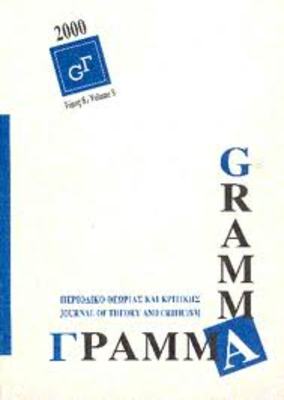Refashioning Dramaturgy : A Stage Rewriting of a 19th-c. Play in 2013 Greece
Part of : Γράμμα : περιοδικό θεωρίας και κριτικής ; Vol.22, No.2, 2014, pages 135-144
Issue:
Pages:
135-144
Author:
Abstract:
Golfo by Spyridon Peresiades is by far the most famous modern Greek play ever written. Since 1894, the tragic-ending love story of a shepherd and a mountain girl has seen a great number of performances and adaptations, both on stage and screen. By the end of the twentieth century, the play was heavily criticized as old-fashioned and overemotional, and was rarely seen on stage. Whenever it found its way to the stage, its reception was not that flattering. However, in March 2013 the National Theatre of Greece staged a new version of Golfo, which attracted large audiences, critical acclaim, and an invitation to be performed at the ancient theatre of Epidaurus. This new production, without altering substantially the language, characters, or plot, turned the old script into a visual and musical canvas, depicting distressed identities and wrecked dreams, and thus transforming, as we intend to argue, a piece of traditional dramaturgy into a work of alternative dramaturgy. Our aim in this paper is, therefore, twofold: first, to explore the ways the recent production rewrites the original text and negotiates its role in stage history, by disrupting its performative boundaries and refashioning its dramatic code; and, second, to discuss the haunting image of a society in mourning, the performance fosters—a "festive" requiem as the director put it—at a time when economic crisis and political instability incite feelings of despair and acts of violence, in response to what is often described, concerning the recent situation in Greece, as a process of modern colonization.1
Subject:
Subject (LC):
References (1):
- Douzinas, Kostas, and Petros Papaconstantinou. "Greece is Standing up to EU Neocolonialism." The Guardian 27 June 2011. Print.Glasman, Maurice, and Jon Cruddas. "Greece and the Birth of Fiscal Colonialism." The New Statement 23 July 2015. Print.Hadjipantazis, Thodoros. From the Nile to the Danube. The Chronicle of the Development of the Professional Greek Theatre in the Wider Context of the Eastern Mediterranean, From the Establishment of the Independent State until the Asia Minor Disaster. [Από του Νείλου μέχρι του Δουνάβεως. Το χρονικό της ανάπτυξης του ελληνικού επαγγελματικού θεάτρου στο ευρύτερο πλαίσιο της Ανατολικής Μεσογείου, από την ίδρυση του ανεξάρτητου κράτους ως την Μικρασιατική καταστροφή.] Herakleio: Crete UP, 2012. Print.—. Komeidyllio. [To Κωμειδύλλιο.] Athens: Ermis, 1981. Print.Halbwachs, Maurice Les cadres sociaux de la mémoire. [Ta κοινωνικά πλαίσια της μνήμης.] Trans. Eleutheria Zei. Athens: Nefeli, 2013. English reference: Halbwachs, Maurice. On Collective Memory. Ed. trans, and with an Introduction by Lewis Coser. Chicago: The U of Chicago P, 1992. Print.Hobsbawm, Eric. "Introduction: Inventing Tradition." The Invention of Tradition. Ed. Hobsbawm and Terence Ranger. Cambridge: Cambridge UP, 1983. 1-14. Print.Holdsworth, Nadine. Theatre and Nation. Basingstoke: Palgrave Macmillan, 2010. Print.Ioannidis, Grigoris. " Go I/o: A Mirror to our National Pathway." [«Γκόλφω: καθρέφτης της εθνικής μας πορείας».] Efimerida ton syntakton 19 Aug. 2013. Print.Katsioti, Iro. "Golfo's Legacy." [«Η τύχη της Γκόλφως».] Greek Theatre from 17th to 20th century. Proceedings of the First Hellenic Conference of Theatre Studies. [To ελληνικό θέατρο από τον 17° στον 206 αιώνα.. Πρακτικά Α 'Πανελλήνιου Θεατρολογικού Συνεδρίου.] Ed. Iosif Vivilakis. Athens: Ergo, 2002. 185-206. Print.Krugman, Paul. "An Impeccable Disaster." The New York Times 11 Sept. 2011. Print.Marinou, Efi. "Like a holy water stream." [«Έτρεξε' σαν το αθάνατο νερό».] Efimerida ton syntakton 19 Aug. 2013. Print.Mitroutsikou, Iro. "An Exceptionally Outstanding Golfo." [«Μια αριστουργηματικά ιδιαίτερη Γκόλφω».] iNewsgr.com. Ν.ρ., 19 Mar. 2013. Web. 23 Sept. 2015 <http://www.inewsgr.com/199/mia-aristourgimatika-idiaiteri-gkolfo.html>.Neophytou, Tania. "Spyridon Peresiades' Golfo and Simos Kakalas' and Nikos Karathanos' Stage Explorations: Nature, Light and Darkness." [«Η Γκόλφω του Σπ. Περεσιάδη και οι σκηνικές αναζητήσεις του Σίμου Κακάλα και του Νίκου Καραθάνου: φύση, φως και σκότος».] Parabasis 13/2 (2015): 93-108. Print.Patsalidis, Savas. "A Fictive Golfo and an Ordinary Nora." [«Η Γκόλφω της φαντασίας και η Νόρα της καθημερινότητας».] Aggelioforos tis Kyriakis 26 Oct. 2013. Print.—. Theatre and Globalization. In Search of "Lost Reality. " [Θέατρο και παγκοσμιοποίηση. Αναζητώντας τη «Χαμένη Πραγματικότητα».] Athens: Papazisis, 2012. Print.Peresiades, Spyridon. Golfo. [Γκόλφω.] Athens: Fexis, 1903. Print.Rasmus, Jack. "The New Colonialism: Greece and Ukraine." N.p., 29 Aug. 2015. Web. 23 Sep. 2015 <http://www.telesurtv.net/english/opinion/The-New-ColonialismGreece-and-Ukraine-20150829-0012.html>.Rebellato, Dan. "From the State of the Nation to Globalization: Shifting Political Agendas in Contemporary British Playwriting." A Concise Companion to British and Irish Drama. Ed. Nadine Holdsworth and Mary Luckhurst. Oxford: Blackwell, 2008. 245-62. Print.Ricoeur, Paul. Memory, History, Forgetting. Trans. Kathleen Blarney and David Pellauer. Chicago: The U of Chicago P, 2004. Print.Smith, Charles Hugh. "Greece and the New Colonial Endgame." DAILY RECKONING. N.p., 1 July 2015. Web. 23 Sept. 2015. <http://dailyreckoning:eom/greece-newcolonialendgame/>.Stamos, Yiannis E. "Golfo Befits Epidaurus." [«Η Γκόλφω ταιριάζει στην Επίδαυρο».] Eleftherotypia 19 Aug. 2013. Print.Tsatsoulis, Dimitris. "What is our Motherland?" [«Τι είναι η πατρίδα μας;»] Eleftherotypia 26 Oct. 2013. Print.Tsokou, Yianna. "Risking Innovation in Dark Times." [«Στοίχημα ανανέωσης σε σκοτεινούς καιρούς».] Skene 5 (2013): 167-73. Web. 23 Sept. 2015. <http://ejournals.lib.auth.gr/skene/article/view/4011/4116>.




